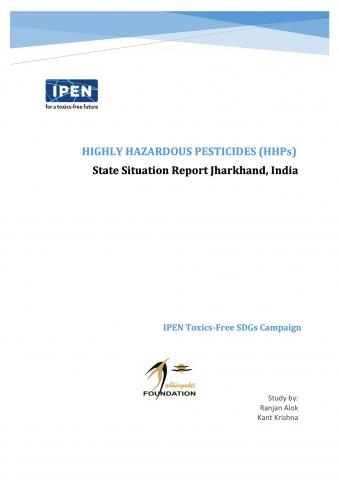Highly Hazardous Pesticides in Jharkhand, India

Jharkhand is one of the prominent tribal states in eastern India. The state capital of Jharkhand is Ranchi. The state was carved out of the southern part of Bihar in the year 2000. Agriculture is the major occupation for more than 70% of the families in the state, most of whom are small and marginal farmers. The state is bordered by Bihar in the north, West Bengal in the east, Odisha in the south, Chhattisgarh in the west and Uttar Pradesh in the northwest. The state has a total geographical area of 7.97 million hectares and a total estimated population of 39 million. For administrative purposes, the state is divided into 24 districts, which are grouped into 5 divisions; namely, Palamu, North Chhotanagpur, South Chhotanagpur, Kolhan and Santhal Pargana.
Sustainable agriculture, in terms of food security, rural employment, and environmentally sustainable technologies such as soil conservation, sustainable natural resource management and biodiversity protection, are essential for holistic rural development. Indian agriculture and allied activities have witnessed a green revolution, a white revolution, a yellow revolution and a blue revolution; now those participating in agriculture activities are also considering agroecology, with the promotion of Integrated Pest Management (IPM) and Natural Pest Management (NPM). Additionally, the government has initiated some programs like the Mission on Organic Farming, Pramparagat Krishi Vikas Yojana, which is making a move towards non-chemical-based farming systems.
This project relates to Sustainable Development Goals 2, 3, 6, 8, 12, 13, 14 and 15
Special thanks to IPEN's South Asia Regional Coordinator Tripti Arora and Regional Hub Toxics Link for their important contributions to the development and finalization of the project.
| Attachment | Size |
|---|---|
| 1.12 MB |
